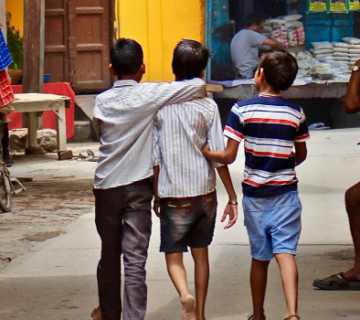What is the vision from North Africa of the migration towards Europe phenomenon? How is it possible to make it person centred, thus moving from a purely economic to a human vision of migration? Interview with Pasquale Ferrara, Italian ambassador in Algiers.
According to the UNHCR*, 75,522 migrants landed by sea on the European coasts of Italy, Malta, Cyprus, Spain and Greece from January 1st to October 21st 2019. In addition, 16,322 migrants arrived by land in Greece and Spain making a total of 91,844 people, of whom 9,270 in Italy, 2,738 in Malta, 1,183 in Cyprus, 25,191 in Spain, 53,462 in Greece. This data shows a decreasing trend (in migration) and documents the emergency phases. It is not however enough so that Europe starts a broad and constructive dialogue on the subject: the prospect of the creation of a European system of flow management remains very remote, and in general the analysis at an institutional level does not take into account the perspective of African countries. In Algiers we joined the Italian Ambassador, Pasquale Ferrara:
Mr. Ambassador, what is the vision from North Africa of the migration towards Europe phenomenon?
Seen from Africa, migration is a historical and structural phenomenon, especially intra-African, because the vast majority of migrant and refugee movements take place between African countries: more than 20 million people live in a country other than their country of origin. Migration to Europe is different and people fear an uncontrolled influx. To speak of migration in terms of differences in development is only part of the picture. In Europe, a distinction is often made between political refugees and economic migrants. But often African economic migrants are the result of bad political management in countries, because there is a problem of governance, of appropriation of resources by oligarchies, of social inclusion.
Therefore, in some way, economic migrants too can qualify as political refugees. Over and above the issue of illegal migration, as far as North Africa is concerned, it would be necessary to restore in the Mediterranean the circular mobility of populations that has always been observed in history. It means, for example, the possibility of coming to Europe for a period of study or work, and then returning to the country of origin. At the moment, these movements are subject to the granting of a visa, but it is very difficult to obtain one because of the many and necessary controls. For many people it is challenging, so the temptation of those who receive visas, even if they are well-intentioned, is often not to return to their country of origin.
The visa must be maintained, but with a view to encouraging circular mobility, it is necessary to think of a more structured system. Then there is another factor that stimulates migration, and that is the difference in the quality of services that a society offers: health services and social security services in general, whose lack of availability and quality also influences, together with other factors such as endemic violence, the sense of security, or school services, so that even those who are not in a situation of absolute poverty try to come to Europe to give a better education to their children. We should therefore invest more in the training of the ruling classes, professionals and educators. In Algiers, even though the numbers are small, we are trying to do so, increasing the scholarships for young Algerians who go to Italy to study music, art, restoration, as an investment for their professional future.
Is the West responsible for the impoverishment of African countries?
I would be very cautious. This is a narrative that is useful for certain Afro-African oligarchies to dismiss their responsibilities when faced with a governance that is dubious in its legitimacy and in its results. The colonial period has marked Africa a lot and the past responsibilities of the West are ascertained, but at least 50 years have passed since decolonization and it is difficult to attribute to the West the problems of today’s African societies. The quality of governance is of great importance. Rather today in Africa there is a strong presence of China with programs related to natural and mineral resources in almost all countries. China considers Africa a large market, but the exchange is asymmetrical in favour of Beijing. However, to compensate for this imbalance, China carries out infrastructural works, stadiums, theatres and cultural centres for billions of dollars at its own expense.
Europe is taking uncertain steps in managing this phenomenon. There is a lack of Community policies and it seems that the principle of shared responsibility does not warm the hearts of Europe.
The choice of solidarity cannot depend on the good will and changing direction of individual governments. The migration issue must be dealt with exclusively by the European Union as such, as is the case with the trade policies for which the EU states have given Brussels exclusive responsibility for negotiating agreements with non-European countries. Today, however, on the one hand, because of a matter of national sovereignty, the states want to retain control over migration and borders, and that is understandable. On the other hand, they accuse Europe of inaction, but they do not give it the mechanisms it needs to operate effectively. But it seems to me unlikely that there will be
progress in this area, given the resistance that this issue encounters in relation to internal policies.
* https://data2.unhcr.org/en/situations/mediterranean
End 1st Part
Edited by Claudia Di Lorenzi


 Italiano
Italiano Español
Español Français
Français Português
Português




No comment